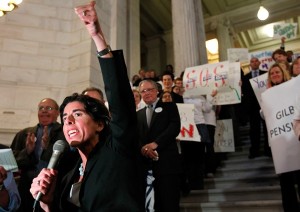 Gina Raimondo “kicked off” her campaign for Governor yesterday, and wouldn’t you know it, but the centerpiece of her policy proposals will be a new invention of Goldman Sachs, the “social impact” bond.
Gina Raimondo “kicked off” her campaign for Governor yesterday, and wouldn’t you know it, but the centerpiece of her policy proposals will be a new invention of Goldman Sachs, the “social impact” bond.
What, you might ask, is a social impact bond? The idea is that some great source of capital like, oh, I don’t know, Goldman Sachs, lends some community millions of dollars to improve early-childhood education. Perhaps they build a new pre-K facility, or even use the money to pay some teacher salaries. A wealth of evidence shows that this kind of investment pays a return of sorts because the kids who enjoy this better education are less likely to become teen parents or teen lawbreakers. It stands to reason, therefore, that the community so enriched by this investment can repay the bond by sending to Goldman Sachs the money that would have been spent on the welfare or jail that those teens didn’t need. How’s that for a win-win?
From the perspective of the public budget, you’re really no further ahead, of course, since the money you were going to spend on jails is spent on paying Goldman instead, but at least you have this shiny new school, and fewer criminals, too.
Of course if your pre-K students grow up to be peaceable, responsible, taxpaying, and generally lovely adults — who happen to live somewhere else — well, you can’t make an omelette without cracking a piggy bank, right?
Snark aside, what do we really have here? Is it a good idea or not? Is this a way for communities to access funds for desperately needed investments, or is it a new way for the financiers who burned down our economy just a few years ago to rape the public funds — again? Bear in mind, please, that there is a substantial risk here. Research about the future costs of jail and welfare are estimates, made to illustrate various cost/benefit analyses. They are not carefully calibrated prices. The weight of evidence says there will be savings, and the side benefit is happy people and less crime. To me, that’s enough to argue for investment, but the happy people and less crime parts of the benefit aren’t going to help pay off a loan.
It might be worth asking at this point, why those communities can’t afford to invest in these improvements the evidence says will pay off. Oh, right, it’s all the tax breaks of the past decades. Did you know that business taxes used to be the third most important source of revenue to the state of Rhode Island? Now they are fifth, behind the lottery and all the fees collected by various departments. Did you know that the richest Rhode Islanders paid over three times the income tax of the average taxpayer in 1996, and in 2011, a bit more than twice? Over the past decades, our state and nation have cut taxes repeatedly in a vain and misguided attempt to stimulate the economy and things have only gotten worse for everyone except those whose taxes were cut.
So now that we can’t afford to make these investments in education and infrastructure (not to mention the human capital our business community claims they want access to but won’t pay for) here’s a new plan: take money from the rich, not as taxes, but as loans, and in return pay them the benefits that used to be thought of as belonging to everyone. And if the benefits don’t actually pan out, do you imagine that the financiers will be at risk?
It’s easy to imagine a community in dire straits, seeking to salvage the futures of some of its residents, with such a desperate and risky scheme. Business owners on Federal Hill used to find themselves wondering in the same way if they should ask the mob for help. But to imagine — no, to actually see and hear — a gubernatorial candidate suggest that this is a good idea on its own merits is appalling. The idea is a disgrace, a wholesale sellout of the very concept of the public good.
So what do we learn here? First, that the creativity of people paid millions of dollars to think of new ideas to make more money is nearly boundless. Over the past decades, we offered a bargain: tax cuts for rich people in exchange for a better economy. But they used the money to buy political power and used it to extract still more money from the rest of us. They are already on the way to owning the world. Here is yet one more way for the fabulously wealthy to solidify their control of our politics and our world.
The other thing we learn? That clearly Gina Raimondo is not at all worried by the idea that she might be perceived as too closely tied to the wolves of Wall Street. The question she should answer: does she want to promote the public good, or sell it?


Deprecated: Function get_magic_quotes_gpc() is deprecated in /hermes/bosnacweb08/bosnacweb08bf/b1577/ipg.rifuturecom/RIFutureNew/wp-includes/formatting.php on line 4387
Deprecated: Function get_magic_quotes_gpc() is deprecated in /hermes/bosnacweb08/bosnacweb08bf/b1577/ipg.rifuturecom/RIFutureNew/wp-includes/formatting.php on line 4387
Deprecated: Function get_magic_quotes_gpc() is deprecated in /hermes/bosnacweb08/bosnacweb08bf/b1577/ipg.rifuturecom/RIFutureNew/wp-includes/formatting.php on line 4387